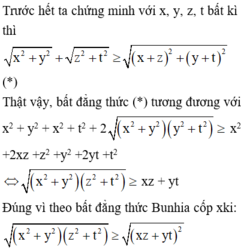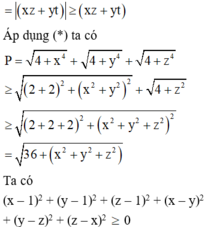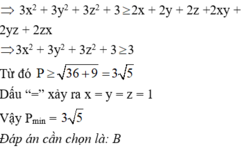Cho các số x y z thỏa mãn x2 + y2 + z2 = 1. Tìm giá trị nhỏ nhất của biểu thức P = xyz+ 2(1+x+y+z+xy+yz+xz) Cảm ơn trước nhé mina_san! Trả lời nhanh cho mình nhé mai mình phải nộp rồi!
Hãy nhập câu hỏi của bạn vào đây, nếu là tài khoản VIP, bạn sẽ được ưu tiên trả lời.


Đáp án D
Ta có C 12 1 . C 10 1 = 120
Khi đó C 12 1 . C 10 1 = 120 . Đặt C 12 1 . C 10 1 = 120
Ta luôn có C 12 1 . C 10 1 = 120
C 12 1 . C 10 1 = 120 Suy ra C 12 1 . C 10 1 = 120
Xét hàm số f t = t 2 − 8 t + 3 trên khoảng − 1 ; + ∞ ,có f ' t = 2 t + 1 2 t + 4 t + 3 2 > 0 ; ∀ t > − 1
Hàm số f(t) liên tục trên − 1 ; + ∞ ⇒ f t đồng biến trên − 1 ; + ∞
Do đó, giá trị nhỏ nhất của f(t) là min − 1 ; + ∞ f t = f − 1 = − 3 . Vậy P min = − 3

*Max
Có: \(x^2+4\ge4x\)
\(y^2+4\ge4y\)
\(z^2+4\ge4z\)
\(\Rightarrow x^2+y^2+z^2+12\ge4\left(x+y+z\right)\)\(\Rightarrow x+y+z\le\frac{x^2+y^2+z^2+12}{4}\)
Lại có \(xy+yz+zx\le x^2+y^2+z^2\)(Auto chứng minh)
Cộng 2 vế của bdtd lại ta đc \(x+y+z+xy+yz+zx\le\frac{5\left(x^2+y^2+z^2\right)+12}{4}\)
\(=\frac{5.12+12}{4}=18\)
"=" KHI x = y= z = 2
*Min : ta có : \(12+2\left(xy+yz+zx\right)\ge x^2+y^2+z^2+2\left(xy+yz+zx\right)\)
\(=\left(x+y+z\right)^2\ge0\)
\(\Rightarrow xy+yz+zx\ge-6\)
Dấu "=" xảy ra <=> x + y + z = 0
Với các giá trị trên ta đc \(x+y+z+xy+yz+zx\ge0-6=-6\)
Dấu "=" <=> x + y + z = 0 và x2 + y2 + z2 = 12
bạn ơi mình giải thế này thì sao nhỉ:
đặt x+y+z=a=> \(a^2=x^2+y^2+z^2+2\left(xy+yz+zx\right)\)
=> \(xy+yz+zx=\frac{a^2-\left(x^2+y^2+z^2\right)}{2}\ge\frac{a^2-12}{2}\)
\(\Rightarrow P\ge a+\frac{a^2-12}{2}\ge-\frac{13}{2}\)( dùng hằng đẳng thức c/m)
dấu " =" <=> \(\hept{\begin{cases}x+y+z=-1\\x^2+y^2+z^2=12\end{cases}}\)
bạn xem thử hộ mik cái =)


\(gt\Leftrightarrow\dfrac{1}{\sqrt{x}}+\dfrac{1}{\sqrt{y}}+\dfrac{1}{\sqrt{z}}=1\)
\(P=\dfrac{1}{xyz}\left(x\sqrt{2y^2+yz+2z^2}+y\sqrt{2x^2+xz+2z^2}+z\sqrt{2y^2+xy+2x^2}\right)\)
\(=\dfrac{1}{xyz}\left(x\sqrt{\dfrac{5}{4}\left(y+z\right)^2+\dfrac{3}{4}\left(y-z\right)^2}+y\sqrt{\dfrac{5}{4}\left(x+z\right)^2+\dfrac{3}{4}\left(x-z\right)^2}+z\sqrt{\dfrac{5}{4}\left(x+y\right)^2+\dfrac{3}{4}\left(x-y\right)^2}\right)\)
\(\ge\dfrac{1}{xyz}\left[x.\dfrac{\sqrt{5}\left(z+y\right)}{2}+y.\dfrac{\sqrt{5}\left(x+z\right)}{2}+z.\dfrac{\sqrt{5}\left(x+y\right)}{2}\right]\)
\(=\dfrac{\sqrt{5}\left(z+y\right)}{2yz}+\dfrac{\sqrt{5}\left(x+z\right)}{2xz}+\dfrac{\sqrt{5}\left(x+y\right)}{2xy}\)
\(=\dfrac{\sqrt{5}}{3}\left(1+1+1\right)\left(\dfrac{1}{x}+\dfrac{1}{y}+\dfrac{1}{z}\right)\ge\dfrac{\sqrt{5}}{3}\left(\dfrac{1}{\sqrt{x}}+\dfrac{1}{\sqrt{y}}+\dfrac{1}{\sqrt{z}}\right)^2=\dfrac{\sqrt{5}}{3}\) (bunhia)
Dấu = xảy ra khi \(x=y=z=9\)
Thấy : \(\sqrt{2y^2+yz+2z^2}=\sqrt{\dfrac{5}{4}\left(y+z\right)^2+\dfrac{3}{4}\left(y-z\right)^2}\ge\dfrac{\sqrt{5}}{2}\left(y+z\right)>0\)
CMTT : \(\sqrt{2x^2+xz+2z^2}\ge\dfrac{\sqrt{5}}{2}\left(x+z\right)\) ; \(\sqrt{2y^2+xy+2x^2}\ge\dfrac{\sqrt{5}}{2}\left(x+y\right)\)
Suy ra : \(P\ge\dfrac{1}{xyz}.\dfrac{\sqrt{5}}{2}\left[x\left(y+z\right)+y\left(x+z\right)+z\left(x+y\right)\right]\)
\(\Rightarrow P\ge\sqrt{5}\left(\dfrac{1}{x}+\dfrac{1}{y}+\dfrac{1}{z}\right)\)
Ta có : \(\sqrt{xy}+\sqrt{yz}+\sqrt{xz}=\sqrt{xyz}\Leftrightarrow\dfrac{1}{\sqrt{x}}+\dfrac{1}{\sqrt{y}}+\dfrac{1}{\sqrt{z}}=1\)
Mặt khác : \(\dfrac{1}{x}+\dfrac{1}{y}+\dfrac{1}{z}\ge\dfrac{\left(\dfrac{1}{\sqrt{x}}+\dfrac{1}{\sqrt{y}}+\dfrac{1}{\sqrt{z}}\right)^2}{3}=\dfrac{1}{3}\)
Suy ra : \(P\ge\dfrac{\sqrt{5}}{3}\)
" = " \(\Leftrightarrow x=y=z=9\)


